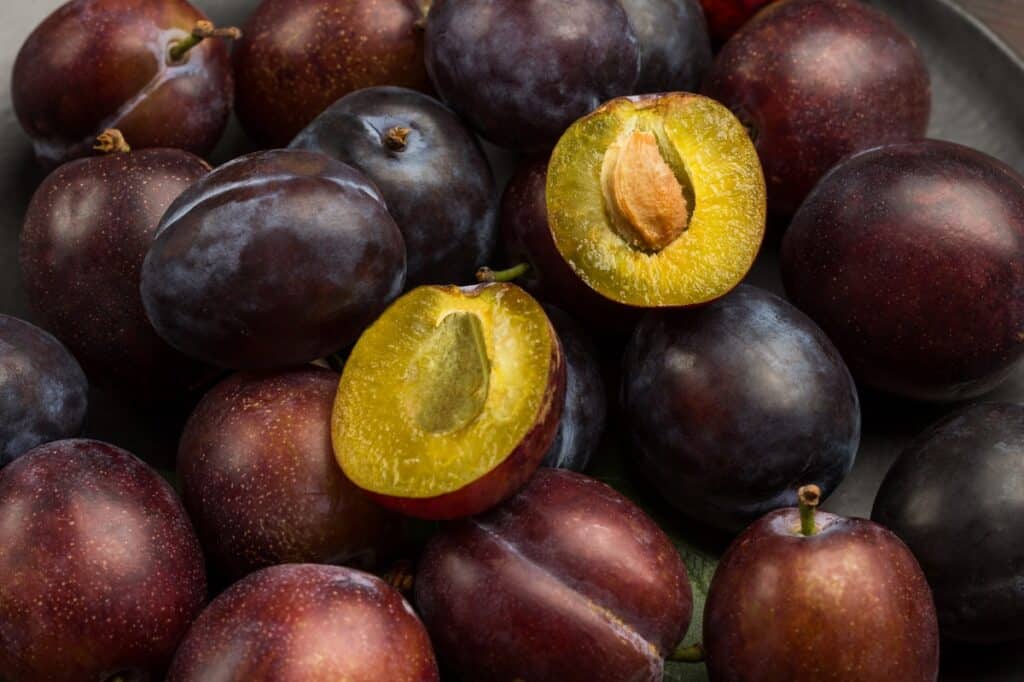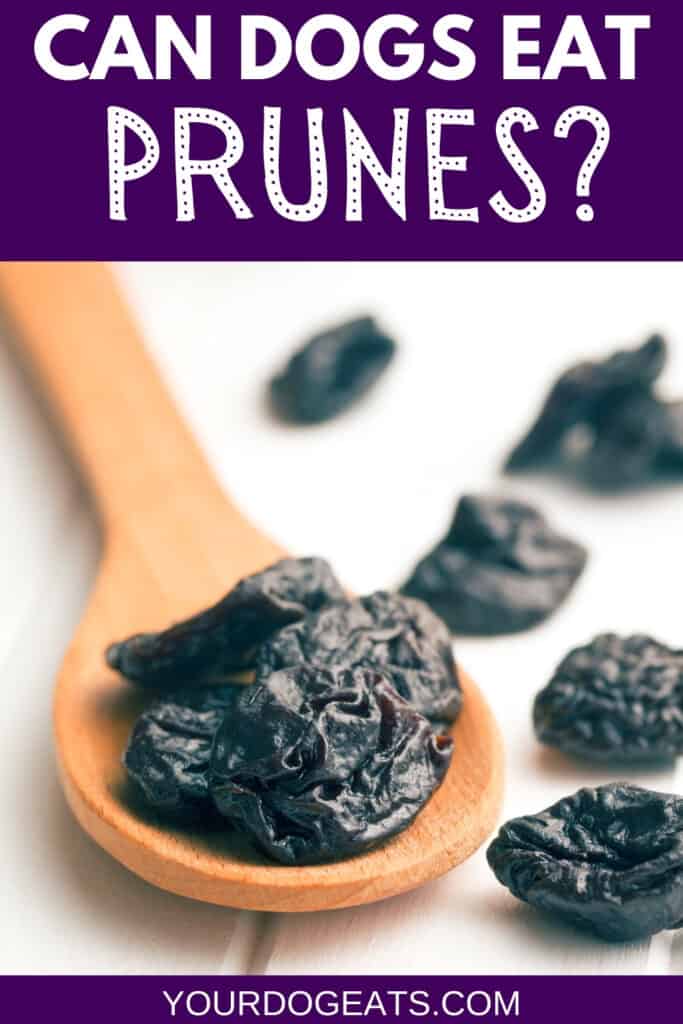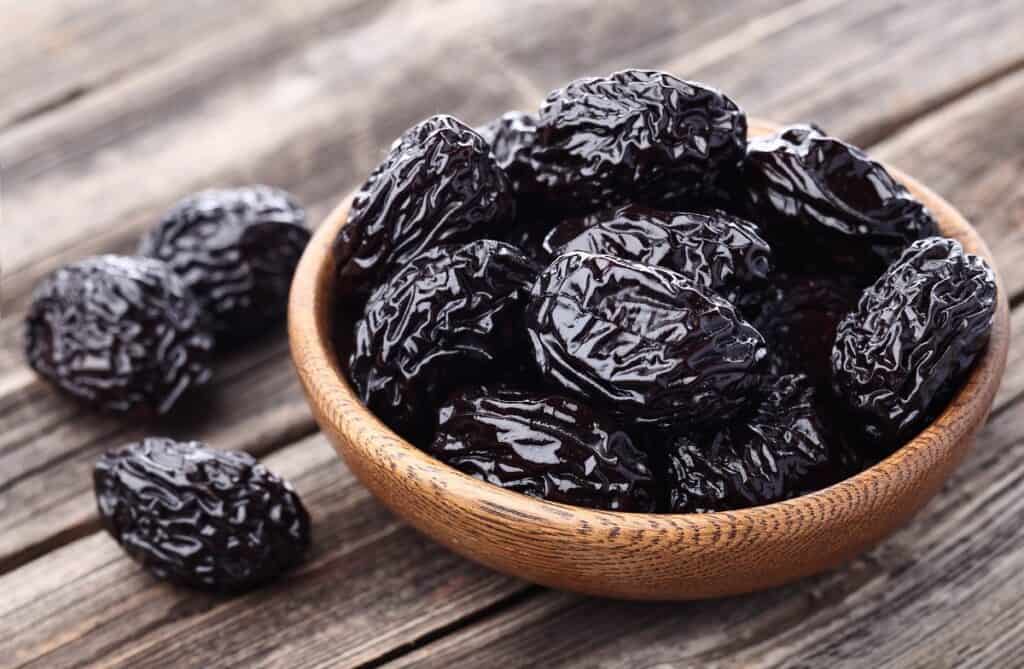If your dog just snagged a prune from your bowl of dried fruit, you might be wondering – can dogs eat prunes? While a pitted prune or two is safe for a dog, it’s smart to prevent your canine pal from eating prunes regularly. It’s also especially important to avoid prunes with pits, as these are far more concerning.
This post was reviewed for veterinary accuracy by Cara Wright, DVM. For more information about our review process, please visit the About Us page. This article is for informational purposes only and should not be a substitute for professional veterinary help.
What are prunes?
If you’re not familiar with them, prunes are actually dried plums. For humans, they’re a tasty, dried fruit snack. They’re also a good source of fiber, and have traditionally been used to help people with constipation. However, these same principles should generally not be applied to dogs.
Can dogs eat prunes?
While it’s not a problem if your pup scarfed down a prune or two, it’s not something that should be given to them regularly.
While some people think prunes can be used for constipation in dogs, this is not an ideal choice. The high fiber content can take the issue to the other extreme, causing diarrhea when consumed in excess. In addition, dried fruit is a fairly concentrated source of sugar. This, combined with the high fiber content, risk digestive upset for your dog.
If you’re looking for natural remedies to help your dog with constipation, foods like pumpkin or spaghetti squash may be better options. (Both have moderate amounts of fiber and are also high-moisture options).
Lastly, from a nutritional standpoint, your dog is not meant to eat a lot of high-sugar foods like dried fruit. These can crowd out other important nutrients like high-quality protein and healthy fats.

What about the pits?
Most prunes on the market are pitted these days, and that’s what we’re referring to above. Rest assured, it’s likely that if your dog ate a prune, it did not contain a pit.
However, if your dog has somehow gotten into a stash of dried plums with the pits intact – that is a larger concern. This could be the case if you purchased prunes from a local market, or if you home dry plums yourself.
First, the pits can be a choking hazard for dogs. They can get lodged in the throat and prevent breathing.
Depending on the size of the pit, it can also potentially cause intestinal obstructions. Be sure to watch your dog for the next few days for any symptoms. If you notice diarrhea, vomiting, lack of stool, lethargy, or your dog seems to have abdominal pain – call your veterinarian as these could indicate a blockage.
In addition, and perhaps most concerning: the pits contain compounds called cyanogenic glycosides, which can be broken down into cyanide when ingested. This is not just found in plum/prune pits, but also in the pits of apricots, peaches, and cherries too.
According to the Merck Veterinary Manual, drying often increases the cyanogenic potential of plants – so dried plums with the pit intact can be risky.
Cyanide can affect the health and oxidation of the mitochondria in the cells, eventually leading to tissue death in important parts of the body like the heart and lungs. Excessive cyanide consumption can be a fatal situation for dogs (and humans too). Initial symptoms can include excitement, rapid breathing, shortness of breath, excessive salivation, spasming, and collapse.
The risk of cyanide toxicity from eating prune pits depends on how many the dog ate, the size of the dog, and whether the pits were broken down or swallowed whole. One pit is unlikely to be a major concern, but multiple could be dangerous, particularly for small dogs.
Call your veterinarian if your dog ingested multiple prune pits. If your dog ingested a large number of prune pits and is displaying any symptoms of cyanide toxicity, this is a medical emergency and you should get immediate treatment. Call your veterinarian en route to an animal hospital.

A Final Word from Your Dog Eats
As you can see, when it comes to the question of “can dogs eat prunes?” — regular prune consumption isn’t recommended for dogs. That said, if your dog ate a pitted prune or two, there’s no cause for concern. If for some reason your dog ate a large amount of prunes, they may suffer from diarrhea for a few days. If your dog ate prunes that still contained pits (or you have any other concerns about your dog) be sure to contact your veterinarian for advice.


